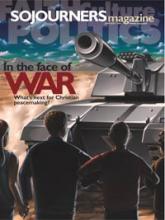A flawed exit poll question has sparked an enormous and important political debate in America, one that will be with us far beyond this election. Asked to name the most important issue that influenced their vote, 22 percent of voters chose "moral values," just edging out terrorism and the economy. That poll result has sparked a firestorm in the media and in Washingtons political circles about who gets or doesnt get the "moral values issue." Conventional wisdom holds that the Republicans do get it and the Democrats dont, and that the "moral values" answer on the survey simply indicated voters who are against abortion and gay marriage.
But of course a Christian who cares deeply about peace likely would have checked the war in Iraq (one of the choices) instead of moral values, and a Catholic coordinator of a food pantry likely would have checked the surveys closest thing to poverty, which would have been the economy or health care. The single "moral values" question was a whole different kind of choice to the rest of the "issues," ignoring the moral values inherent in those other concerns.
An important poll taken several days later bore that out and actually had the war in Iraq rated as the highest issue of moral importance for those who voted this time. The greatest moral "crisis" was named as "greed and materialism," followed closely by "poverty and economic injustice." (See "Seeking Common Ground).
Read the Full Article
